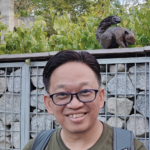TLDR: What does independence in Buddhism look like? Zeb shares how awareness, compassion, and acceptance help him to experience some liberation from suffering in daily life. He also discovers what the Buddha’s half-smile represents to him.
Quick quiz, it is the month of August, what comes to mind? Fireworks may come to your mind since it’s the month of the celebration of Independence in 3 countries in Southeast Asia. The 3 countries are: 1) Singapore Independence Day, which is observed on the 9th of August; 2) Indonesia Independence Day on the 17th of August; and 3) Malaysia Independence Day on the 31st of August, respectively.
For me, independence refers to experiencing the fruits of the Dhamma, liberation from the suffering of daily life. Gaining ‘independence’ from the grasp of suffering.
This August, I wish to share my experience with you on how awareness, compassion, and acceptance can help you realise ‘independence’. When we can free ourselves, we are freer to free others of their suffering in turn. As a bonus, I would like to share what the Buddha’s half smile represents to me.
Awareness helps us stay on course:
If we are not aware of what is on the ground that may trip us over, we may suffer serious injury. Looking at suffering when we are suffering can make the pain seem endless. But if we look deeper, we may note that there are two levels of pain.
The Buddha uses the parable of the 2 arrows, with the first arrow being the actual pain, while the second arrow is our reaction to the initial pain. Knowing the difference between them brings to mind that “pain is inevitable, but suffering is optional.”
We suffer because we are afflicted by the three poisons in Buddhism – greed, hatred, and delusion. We suffer because we are greedy and desire more. We want that extra serving of ice cream when we are already full leading to unwanted stomachaches.
We suffer because we are angry that we missed out on the popular Taylor Swift concert tickets purchase, while our enemies got lucky. We suffer because we are lost in our own delusional thinking that we should not have to suffer in life.
We ignore the 1st Noble Truth, that “There is Suffering.”
When we are aware and realise how we are afflicted by the three poisons, we may have a chance at suffering less.
We are less caught up with the pattern of clinging, pushing away, or being lost in our faulty thinking that life is unfair just because we suffer in our daily life.
I lost my job as a Counsellor in June 2023. I practised letting go of my desired identity as a healer. I accepted the emotional turmoil that I experienced as I faced the loss of my coveted career. I saw the pain of losing my job and discerned to not burden myself with additional suffering, by playing the blame game.
Karunā (compassion) when suffering overwhelms
Pain is pain, we do have to honour the power of pain in its ability to overwhelm our senses. In meditation retreat practice, we are encouraged to watch pain in earnest mindfulness, because pain is also subject to the law of impermanence. Yet the truth remains that some pain may take a little longer to go away than we can handle.
A strategy I found to be helpful in cases where the pain was overwhelming was to apply compassion to myself.
The traditional phrases that we can use to apply compassion go like this: “May I be free from pain and suffering.”
Just reciting the compassionate phrase repeatedly, can have a calming and relaxing effect on us, and I observed that my pain slowly reduces in its intensity, because I was not so tense and uptight about the pain anymore.
I know it works for physical pain because I have not once, but two different hospitalization experiences in the past 4 years, with a combined hospital stay of 26 days in total!
I became an unwilling participant in observing human pains, both of myself and others, in a hospital setting. I am also grateful to have excellent medical care at Singapore’s Hospitals.
Using my medical pain – being hospitalized, was a valuable lesson in understanding suffering. I observed that I can choose to suffer less because I was able to apply mindfulness and compassion in facing my pain with much patience.
There are limits to what painkillers can do to mitigate the pain. I tried to observe the pain mindfully, but my mind was just too confused and distressed under the cocktail combinations of physical pain, painkillers to manage the pain, and the mental pain of being alone in a hospital ward.
I tweaked the compassion phrases to “May I be free from pain and suffering, as much as possible,” given that the strongest painkiller was only capable of dulling the pain so much, and I cannot realistically expect the pain to disappear.
Surprisingly, or unsurprisingly, when I notice that I am more relaxed and accepting of the pain, the suffering naturally reduces in its intensity.
Acceptance of our reality:
The 1st Noble Truth states that “There is Suffering.” No need to run away from suffering. We are not choosing to embrace unnecessary suffering, but we learn not to run away from inevitable suffering.
We are learning not to add the 2nd arrow of suffering, on top of the 1st arrow of pain.
When suffering arises, we can watch it mindfully, and observe the ever-changing nature of the physical, emotional, and mental nature of the suffering.
Acceptance is not about being a defeatist, it is instead a courageous act, to accept reality for what it is. It is having the inner confidence that one can tackle whatever things life throws at us. Of course, we are armoured with the Wisdom of the Buddha’s teaching, to have various practices such as Mindfulness, 4 Brahmavihārā, and Forgiveness, to help us face and overcome the challenges in life.
With mindfulness, I pay attention to my ever-changing thoughts and emotions about the loss of my job. Sending loving kindness to myself, I try to maintain a positive mindset with the inevitable change.
Practising compassion, I strengthen my empathy for myself and others who are affected by layoffs and retrenchment.
I remain joyful for those who have a job now, for they are not suffering from the uncertainty of job loss.
And I try to stay equanimous, knowing that change is inevitable in life and that I will be employed in due time, with the right effort placed in my job search process.
Finally, I try to forgive myself for being less office politics savvy which may have led to my job loss; and I resolve to continue to learn and get mentoring to up my game in the workplace.
Hence, I suffer less, by having the wise understanding that there is suffering in life and recognising that it is not a personal failing to face suffering, or that I am being punished by some invisible beings out there.
I also want to thank and express my anumodana (gratitude) towards my kalyāṇamitta (spiritual friends) who have inspired me to continue learning and practising the Dhamma.
My spiritual friends reminded me of the impermanence of life’s ups and downs, and that I would suffer if I were stuck in holding on to my perceived identity loss of a Counsellor when I lost my job; but by turning to the Dhamma, I can find some solace and further deepen my understanding of the suffering and impermanence of one life’s status.
The half smile:
As I journey through life and the inevitable challenges in life, by practising the Dhamma, I come to understand the Buddha’s half smile, as realising, and accepting the suchness of life that there is nothing that I need to push away or to cling to and that is okay.
When I am secure in my acceptance of the Buddha, Dhamma, and Sangha in my life, I too smile contentedly like the Buddha, that I will have both wisdom and compassion to meet life challenges resolutely, with calm and ease.
The ultimate independence:
In conclusion, I hope the above personal sharing inspires you to continue to practice the Dhamma to attain the ultimate independence, which is Nibbana (Enlightenment). If we practice the Dhamma, we can find moments of mini-independence and freedom, that will help buffer against our day-to-day living stressors.
Whatever small amount of ease and lightness in our life that we can glean and experience, it will surely continue to build upon our faith and practice in the Dhamma.
I wish you too will have a taste of experiencing liberation and smile like the Buddha’s half smile. Sukhi hontu – May you be well and happy.
Wise Steps:
- Explore how you can practice Mindfulness and Compassion in recognising and enduring the minor inconveniences in life.
- See if you can adopt the Buddha’s half smile in accepting the inevitable challenges in life.
- If you are in a position to support your friends who are in career transition, extend your help. You may refer to this past HOL article by Livia Lee for additional ideas to support those who faced layoffs.


